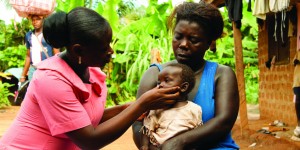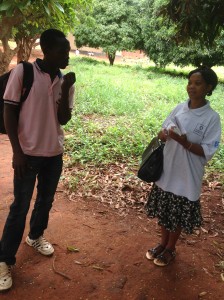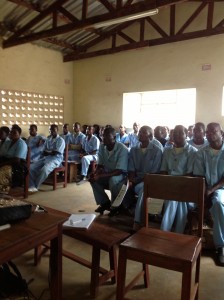CHWs & the 2014 Ebola Crisis: An Opportunity for Community-Level Care

Ebola viral disease is a severe, often fatal illness that is transmitted by direct contact with blood, bodily fluids, and tissues of infected animals or people. As of August 15, 2014 there have been 2,240 cases of Ebola and 1,229 deaths from Ebola in Guinea, Liberia, Nigeria, and Sierra Leone. The difficulty in controlling the spread of the virus has caused the 2014 outbreak to be the most severe in terms of number of cases and human fatalities since the discovery of the virus in 1976.
The virus transmits easily amongst humans who are in contact with bodily fluids from those who are infected with and symptomatic of Ebola virus. All human cases in 2014 (with exception of the index case(s)) were believed to have been exposed through other humans. Human-to-human transmission can be caused by an inability to seek care when ill and failure to follow safe burial and health care practices. Additionally, lack of basic infection control measures such as hand hygiene, use of personal protective equipment, cleaning and disinfection measures, and waste management increase risk of transmission.
The Role of CHWs in Controlling Ebola
Community health workers (CHWs) are community members who are given short-term training to provide basic health service. Often nominated and trusted by community members, CHWs are uniquely positioned to improve access to care, health-seeking behavior, and healthy behavior. The One Million Community Health Workers (1mCHW) Campaign believes that, in the context of Ebola crisis response, CHWs, if provided proper training and adequate safety equipment, can play a key role in containing transmission through the following activities:
1. Sensitization of Communities on Ebola
Lack of information or communication about the disease can lead to unsafe interaction with Ebola patients or unwillingness to cooperate with health workers. In August 2014, for example, a Liberian quarantine center was destroyed by protestors who had misconceptions of Ebola as a government hoax, or who were frustrated with patients being brought into the capital. As CHWs are often trusted members of the community, they can play a key role in promoting Ebola awareness by disseminating accurate information about Ebola and counseling on protective methods. This should include providing instructions on proper burial method to the relatives of the deceased, ensuring that patients go to a treatment center if symptoms emerge, detecting symptoms amongst community members, and counseling on basic infection control and sanitation measures.
2. Contact Tracing and Surveillance
 Controlling an outbreak requires rigorous assessment and follow-up of exposed cases. This requires identifying all people who may have been exposed to a person with Ebola and checking for signs of illness everyday for 21 days – the maximum number of days of Ebola’s incubation period. Those who begin to develop Ebola symptoms should then be isolated to avoid further transmission, and then their contacts also traced and observed for 21 days. Given CHWs’ ability to provide basic health surveillance in their communities, they can play a key role in controlling the outbreak if done carefully with proper safety precautions and adequate supervision.
Controlling an outbreak requires rigorous assessment and follow-up of exposed cases. This requires identifying all people who may have been exposed to a person with Ebola and checking for signs of illness everyday for 21 days – the maximum number of days of Ebola’s incubation period. Those who begin to develop Ebola symptoms should then be isolated to avoid further transmission, and then their contacts also traced and observed for 21 days. Given CHWs’ ability to provide basic health surveillance in their communities, they can play a key role in controlling the outbreak if done carefully with proper safety precautions and adequate supervision.
UNFPA has worked with the Government of Sierra Leone to conduct contact tracing to identify people linked to confirmed or probable Ebola cases using CHWs. CHWs were trained to identify household members with possible symptoms as well as people who may have been exposed. This data is sent to the District Surveillance Officer and the Government-manager District Ebola Task Force. Additionally, individuals who are identified by CHWs with symptoms of Ebola can be monitored closely. In Guinea, the CDC has trained CHWs to follow up on people who were exposed to Ebola for 3 weeks, checking on symptoms and reporting findings to a supervisor. Reported cases would then be tracked and sent to treatment centers with the hope of avoiding further transmission.
Given the need for interaction with possible exposed patients, this contact training method would require rigorous training on safety precautions, appropriate equipment, and supervision to not only reduce the risk to the CHW, but also the risk of spreading the virus to other households.
CHW Safety And Training
The 1mCHW Campaign would like to stress the importance of the fact that any health worker interaction with possible Ebola cases requires the strictest safety precautions. Health workers risk infection while interacting with symptomatic patients due to close contact with bodily fluids. Specific training on special care to avoid exposure to a patient’s blood and bodily fluids (as well as the use of face protection and gloves) can help to protect community health workers. If CHWs are recommended to partake in contact tracing, it is essential that adequate measures be taken to protect them from exposure and reduce risk of transferring to other households.
with possible Ebola cases requires the strictest safety precautions. Health workers risk infection while interacting with symptomatic patients due to close contact with bodily fluids. Specific training on special care to avoid exposure to a patient’s blood and bodily fluids (as well as the use of face protection and gloves) can help to protect community health workers. If CHWs are recommended to partake in contact tracing, it is essential that adequate measures be taken to protect them from exposure and reduce risk of transferring to other households.
Rigorous training should be provided to CHWs on Ebola control activities, sensitization techniques, and safety measures. Additionally, CHWs should be thoroughly tested on their knowledge of these procedures to ensure that ability to adhere to proper protocol. It will be vital to ensure standardized training, proper supervision and equipment, and regular quality assessment of these activities for a robust response at the community level to assist in Ebola control efforts.
Next Steps: Investing In Community Health Workers
The 1mCHW Campaign believes that investing in community health workers, as a formal part of the health system response to Ebola, will be critical in containing the outbreak and protecting communities. Ministries of Health in many West African countries, with support from the 1mCHW Campaign, have been developing community health worker deployment plans as a part of a general primary health care strategy. However, urgent funding is needed to be able to deploy these CHWs with special emphasis on Ebola response. There have been strong examples thus far on the use of CHWs in community sensitization and contact tracing of Ebola patients. Proper investment on the professionalization of a larger scale CHW program will be key to containing the outbreak and strengthening fragile health systems.

8 Comments
Henry Perry, Department of International Health, Johns Hopkins University
This statement is a powerful one that I support wholeheartedly. The potential of CHWs to play a crucial role in the control of the Ebola epidemic is just one of the many important contributions that CHWs can make to improve health in settings with a high burden of disease and weak health systems. Building strong CHW programs should be the first priority in improving the health of populations in these settings. The Ebola epidemic provides an opportunity to build a strong, robust and sustainable CHW program in which local surveillance can detect cases of disease in need of treatment (or, in the cases of persons with symptoms of Ebola, isolation) and for many of these, particularly childhood pneumonia, diarrhea and malaria, provide prompt and early treatment.
1mCHW Campaign
Dr. Perry –
Thank you so much for your statement of support! The 1mCHW Campaign agrees that the ebola epidemic provides a good opportunity to focus on health systems strengthening, particularly for CHWs, since the health systems in the countries worst effected seem to be crumbling as this outbreak continues. We are working closely with partners on the ground in West Africa to galvanize support for CHWs during this very critical moment in time. The 1mCHW Campaign is hopeful that CHWs will get the necessary support to continue to provide critical health services, as well as assist in the efforts to manage this epidemic.
Joyce Latura
Just as CHWs are a vital link in community education for countries experiencing Ebola outbreaks, CHWs in neighboring counties should also be educating their communities. A community or a family is better equipped to prevent further spread when they understand the disease. Learning the symptoms, the treatment, the prevention of Ebola well in front of the disease allows a community to plan how to respond to it’s citizenry. It is possible the current Ebola outbreak may not spread outside the already affected West Africa region, but unless a global effort responds to the affected areas now, the disjointed education/prevention messages will not create the critical mass impact needed. I support the work of CHWs and the vital role they play in the health systems in their communities. A campaign to educate all CHWs about Ebola no matter their country of work is needed now. With the shortage of health care workers in developing nations, CHWs are filling a need. Let us not lose CHWs in this fight.
1mCHW Campaign
Joyce –
Thank you for your insightful comments. The 1mCHW Campaign has been working with several partners to develop and distribute CHW training materials on Ebola community sensitization so that CHWs across sub-Saharan Africa can incorporate Ebola safety information into their regular home visits and community information sessions. We believe that community education is key to overcoming many health issues that impact the developing world, and recognizing the severity of this outbreak, we agree that providing community sensitization on Ebola in neighboring countries is imperative to ending this epidemic.
Community Health Global Network, Peg Cumberland, Ted Lankester
The Community Health Global Network strongly endorses the views expressed here by the One Million Community Health Workers campaign – both regarding the valuable role CHWs have the potential to play in responding to the Ebola outbreak and the importance of ensuring that CHWs working in communities directly affected by Ebola are sufficiently well trained and equipped to maintain the risks to which they are exposed within reasonable limits.
With a view to strengthening the community-level response to Ebola and encouraging best practice CHGN is in the process of establishing a Community Ebola Response Consortium and also compiling a Community Ebola Response Toolkit. It is hoped that these two initiatives will facilitate collaboration and the sharing of ideas and resources between the many organisations working to tackle Ebola at the community-level in English-speaking West Africa and also increase their ease of access to good educational and training materials.
The CHGN would welcome the involvement of the 1mCHW campaign in this Consortium and in the compilation and on-ongoing updating of the Toolkit.
1mCHW Campaign
Dear Community Health Global Network –
Thank you so much for your statement of support! The 1mCHW Campaign fully believes in the use of best practices to strengthen both community-level and overall Ebola epidemic response. Both the Response Consortium and the Ebola Response Toolkit sound like promising initiatives. We look forward to hearing more about them as things develop within CHGN!
Tembeng Hedley Tah
The idea of CHW is a brilliant one. The Community health workers should be chosen based on their areas of residence. The reasons for this are simple: firstly, the community worker is known and trusted as already established.
Secondly, typical average African communities have the tendency of practising medical pluralism. What I mean here is that it is possible to have a family who will hang on to their ill relative and try to manage the situation before seeking professional medical attention. Again, there are traditional rites that are performed with corpses. The role of the CHW therefore is to be able to trace such situations and report to hierarchy early enough for the right thing to be done. To do this, the CHW must master the territory which is assigned to him, thus justifying the argument that they should be chosen from the areas where they reside.
This will go a long way to strengthen community based response to the epidemic.
Braima Patrick Kanneh
Thank a lot it is really working in my country and especially My District Kailahun. With the help of them we are at zero infection today.